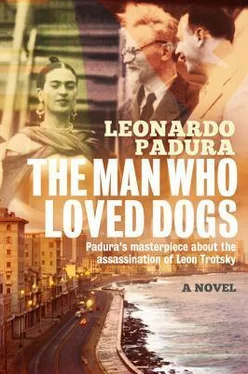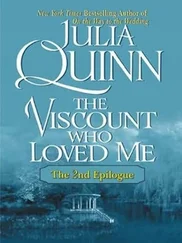Ramón looked at his brother and remained silent. Experience had taught him that there was no need to push bad news, as its weight always propels it forward.
“Caridad is coming in two days. She called me this afternoon.”
Ramón looked outside. The sky was reddish, announcing the coming snow. Luis dropped his extinguished tobacco in the wastebasket.
“She asked me if she could stay with you. Since Roquelia is leaving. .”
“No. Tell her no,” Ramón said, almost without thinking about it, and returned to the living room, where the visitors were putting on their coats to leave. Ramón bid them farewell with promises of speedy reunions, and when Leonid Eitingon went to kiss him, he moved his face and pressed it against the adviser’s ear.
“Caridad is coming,” he told him, and kissed him.
Ramón could see how Eitingon’s blue eyes regained the brilliance dulled by the alcohol. The mere mention of that name seemed to reveal in him intricate chemical reactions that had to be beyond an already worn sexual empathy. He and Caridad were definitively kindred souls, united in their capacity to hate and destroy.
“I’ll call you tomorrow, kid.” He smiled and, with his gloved hand, patted Ramón’s face.
“No, it would be better if you didn’t call me again. . I’m sick of rolling around in shit.”
As he washed the dishes, Ramón put a record of Greek songs he had grown fond of on the record player at a very low volume. His mother’s imminent visit was disquieting, and when he was drying the plates, he stopped to observe the arc-shaped scar on his right hand. Those marks on his skin, the scream in his ears, and the shadow of Caridad were like the chains tying him to his past, and the three could be terribly heavy if he tried to move them together. The scar and the scream were indelible, but at least he could keep his mother far away. In prison, accompanied by the scream and the scar, he had continued hating Caridad, blaming her for the failure of his escape plans. But he remembered that during the infinite psychological exams he had been subjected to in Mexico, the specialists thought they saw, in the midst of that hate, the presence of an obsession for the maternal figure that some classified as Oedipal. When he learned of such opinions, he chose to laugh in the psychologists’ faces, but he knew that something lost in his subconscious must have freed itself through an unforeseen channel, alerting the specialists. The memory of Caridad’s kisses, whose warm and aniseed-flavored saliva caused ambiguous feelings in him; the unease it always caused him to see her in the company of other men; and the uncontrollable power his mother had exercised over him had an unhealthy component from which he had tried to free himself through distance and hostility. The psychologists’ opinion had made him meditate on her attitude toward him and on his weakness before her, and he began to rescue from his memory caresses, words, gestures, closeness, and palpitations that seemed painfully perverse to him.
Despite the exhaustion of an entire day of work and of having drunk more than he usually did, Ramón tossed and turned in his bed, pursued by the idea of a reunion with his mother, until dawn became visible in the sky and he watched the first snowfall of that autumn. Contemplating the snow, Ramón recalled the train trip he had taken at the end of 1960 to the limits of Soviet Asia, in the company of Roquelia, two young KGB officers, their guides and custodians. After twenty years of confinement, that trip was supposed to be a liberation, the enjoyment of moving for days and days, crossing such diverse worlds, crossing time zones and the logic of time (a few feet from where it is now today, you can return to yesterday or jump to tomorrow). With his own eyes, he discovered the country’s economic strength, the schools built across its immense territory, the dignity of the poverty of its Uzbek, Kyrgyz, and Siberian children, a new world that made him feel rewarded — made him think that his personal sacrifice had been for something. But the return trip caused a contradictory feeling. It was not due to the fact that, in the two days the train was stopped due to a freeze, the restaurant car had turned into a kind of combination bar and latrine when a group of soldiers took it over and spent each hour of the delay drinking vodka, urinating, and vomiting in corners. What happened was that remaining immobile, surrounded by the infinite and impenetrable whiteness of the frozen steppe, returned to him an overwhelming feeling of powerlessness, more crushing than what he had felt in the many cells in which he had lived. Something in that January Siberian landscape paralyzed and oppressed him. And that oppression, he thought, was the exact opposite of confinement: it was the result of immeasurableness, of the oceanic immensity of the white landscape that could only be seen for a few hours each day. It suffocated him, and he understood that the infinite whiteness could overwhelm him to the point of madness.
Ramón wasn’t aware of the exact moment he had fallen asleep. When he awoke, close to eight, he saw Ix’s and Dax’s anxious faces next to the bed, long after the time for their morning evacuations had already passed. The brief sleep, nonetheless, had not freed him from the growing unease that plagued him throughout the night.
As he got dressed, he placed the coffee on the stove. He saw on the balcony thermometer that the temperature was minus eight degrees and observed Gorky Park, on the other side of the river, completely covered by clean snow. When he withdrew the coffee pot, he placed the wide blade of a knife very similar to the one he had used in Malakhovka over the gas flame. He drank the coffee, lit a cigarette, and smoked until he saw the color of the steel go red. He put out his cigarette, wetting it in the sink, looked for the dishrag he had used the night before to dry the plates, and folded it twice, biting down forcefully on it. With his left hand, he took the knife’s handle, which had turned from red to white, and, with his eyes closed, placed the tip over the scar on his right hand. The pain made his knees buckle and prompted tears and some smothered cries. He threw the knife into the sink, where he heard it sizzle in the water. When he opened his eyes, he saw wisps of grayish smoke and spit out the rag. The smell of burned flesh was sweet and nauseating. He opened the faucet and stuck his hand under the freezing water as he wet his face with his left hand. Relief came when the cold made his hand fall asleep. He took a handkerchief out of his pocket and, after drying his face, covered the seared skin, under which, he supposed, the scar had disappeared. He felt, despite the pain, that his soul weighed less. He took another clean handkerchief, wrapped his hand again, and went out.
Ix and Dax’s anxiety made them bark a couple of times as they went down in the elevator. The building’s watchman made a comment about the weather and the preparations for the parade for the anniversary of the revolution that Ramón, wounded by pain, barely heard. Awkwardly, with his left hand he wrapped his scarf around himself twice and went out to the path, where his borzois were already running with their snouts stuck to the ground. Ix and Dax started to run through the snow, like two children stepping on it for the first time. Snowflakes were still falling here and there and Ramón raised the hood of his jacket. With the dogs’ leashes in his left hand and a cigarette between his lips, he crossed the Frunze Quay and descended the stairs that went down from the sidewalk to a platform that was almost level with the river.
Leaning against the metal railing, with his dogs seated next to him, his jacket sprinkled with snow, and his hand wrapped in a black-polka-dotted handkerchief, Ramón began to smoke with his eyes fixed on the flowing river, on whose banks a layer of glitter had formed. Instead of that dirty and frozen river, would he ever again see the resplendent beach of Sant Feliu de Guíxols? The pain and bitterness painted a frown on his lips, when he said out loud:
Читать дальше











